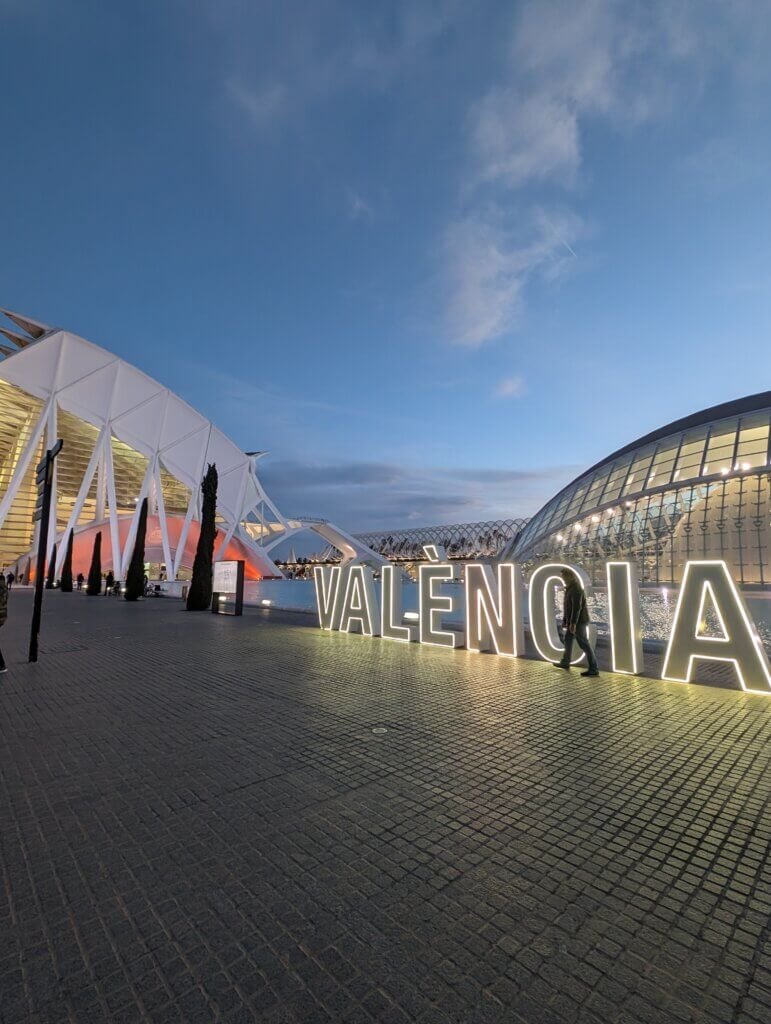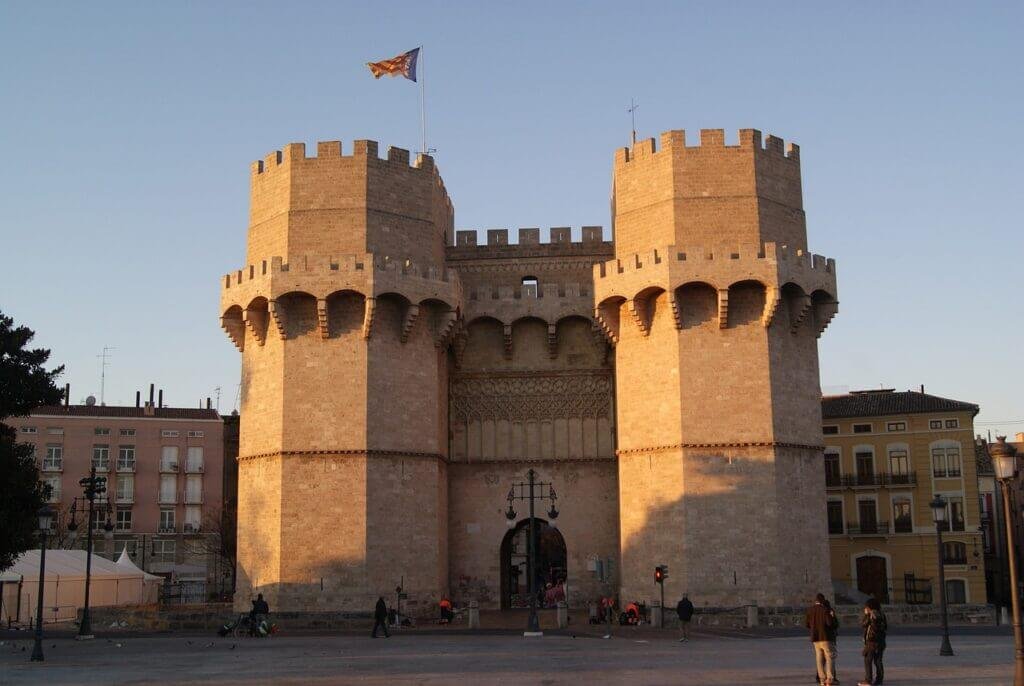Let’s go over some useful expressions in Valencian to help you enjoy a lovely holiday – while still respecting the local language and culture. This Valencian language guide provides practical phrases you might need. Because even if you don’t speak it fully – you can still learn a couple phrases to help you get by!

What is El Valencià?
El Valencià, also known as català, is a language that comes from Latin. It’s similar to Spanish, Italian, French, etc.
Valencià refers to the specific dialect of Catalan that is spoken throughout the Valencian Country. You can think of the difference between Valencian and Catalan as the difference between American English and British English. There are some changes – but ultimately, it’s the same language.
It’s also the native language of the area – with Spanish being a language that the locals also had to adopt during the years of colonization and at the turn of the 20th century. But Valencian remains the official language that’s used in government, schools, and at home for many families.
In other words – if you’re coming to Valencia, you’ll need to learn a bit of el valencià (pronounced va-len-cee-AH).
Useful Expressions in Valencian for Travelers:
Instead of going into a full guide into Valencian, let’s look at some basic travel essentials. We’ll go over some useful expressions in Valencian for tourists, without worrying too much about the grammar.
But of course, if you have any questions or concerns – just send me a message and I’m happy to help!
You can also look at the Cambridge Dictionary for other translations.
Basic Conversation

Let’s start with the most basic of words. These are all phrases you can mix in to begin conversations, or to have a polite interaction with someone.
- Hola – Hello
- Bon dia – Good morning
- Moltes gràcies – Thank you
- Jo soc Kevin – I am Kevin
- Adéu – Goodbye
- Per favor – Please
- De res – You’re welcome
- Com estàs – How are you?
- Molt bé – Very well
- Parles anglés? – Do you speak English?
- D’acord / Val – Okay, understood.
- Sí / No – Yes / No
Airport Phrases

Next, let’s look at a few basic phrases you might need at an airport. Remember, you’ll still want to start the conversation with a “Bon dia”, as well use the phrases from above as a response. If you speak no Valencian at all, it might be hard to have a full conversation – but this should help you get things started.
- He de facturar una maleta – I need to check in a bag.
- He perdut el vol – I missed my flight.
- On està la porta 34? – Where is gate 34?
- Passaport – Passport
- Duanes – Customs
➡️ Here’s how to get from the airport to the city center.
Restaurant Phrases
I find that one of the most common situations where you need the local language is when you go to restaurants. So let’s look at some common expressions in Valencian at a restaurant.
- Teniu taula per a dos? – Do you have a table for two?
- Que teniu de cervesa/vi? – What kind of beer/wine do you have?
- Teniu menú del dia? – Do you have a menú del dia?
- Em poses una botella d’aigua? – Can I have a bottle of water?
- De entrants, voliem unes braves – For appetizers, we would like the braves.
- Voliem una paella valenciana – We would like the paella valenciana
- Ens portes la carta de dolços? – Could you bring us the dessert menu?
- Ens porta el compte quan pugues? – Could you bring us the bill please?
- Bon profit! – Enjoy!
Note: The menú del dia is a standard practice for lunch during the week. It’s a reduced menu at a much cheaper rate.
➡️ Check out my restaurant guide for Valencia
Hotel Phrases

While most hotel workers will likely speak English, this is the perfect time to practice a bit of Valencian! Since the interactions are simple and straightforward, you can get some realistic practice with the local language without struggling too much.
So here are some useful expressions in Valencian to use at a hotel:
- Tenia una reserva a nom de Kevin – I have a reservation under the name “Kevin”
- En quina planta està? – Which floor is it on?
- A quina hora és el desdejuni? – What time is breakfast?
- A quina hora és el checkout? – What time is checkout?
- Habitació – Room
Quick note for Americans: In most of Europe, when people say “first floor”, that would be what you consider the “second floor”. Here, the floors start at zero (ground floor), and then go up.
➡️ Here’s where to stay in Valencia
Buying Tickets

So you’re all settled in, you know how to grab a quick meal, and now you want to go see some tourist attractions. Luckily, you only need a couple of phrases to navigate getting into most places. So let’s look at a few more helpful expressions:
- Dos entrades per favor – Two tickets, please
- En targeta / En efectiu– By card / With cash
- Teniu descompte amb la València Tourist Card? – Do you have a Tourist Card discount?
Lots of the most common attractions in Valencia will have a discount with the Valencia Tourist Card. Make sure to read my full guide to see if it’s worth it for you!
Asking For Directions

Finally, if you really want to get an immersive experience and talk to the locals – let’s look at how to ask for help in Valencian. If Google Maps isn’t working and you’re lost, then you have no other choice than to speak with a local.
So maybe screenshot this page just in case you don’t have internet access!
- Perdó, em pots ajudar? – Excuse me, can you help me?
- On està la plaça de l’ajuntament? – Where is the City Hall Square?
- Com s’arriba a la catedral? – How do you get to the cathedral?
- Com es compra els bitllets del bus? – How can I buy a bus ticket?
- On està el lavabo? – Where is the bathroom?
➡️ Don’t want to end up without any mobile data? I recommend using Airalo.
Travel Resources
I hope this article helps you get around a bit easier when you come visit Valencia. Even though many Valencians will speak English, it’s your job as a tourist to learn a bit of the local language.
Even just a couple of useful phrases will go a long way in showing your respect.
And if you need some more support on your trip, make sure to check out these other resources:
FAQs
In Valencia, the official language is Valencian. As it also belongs to the Kingdom of Spain, Spanish is also understood by the locals.


